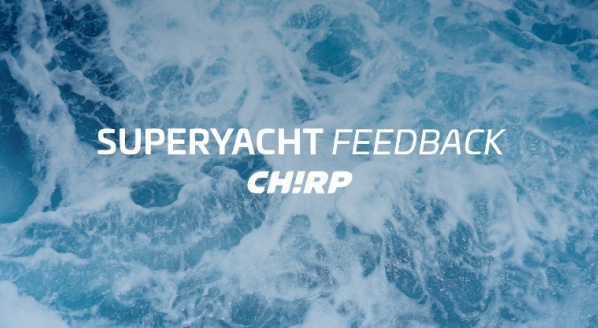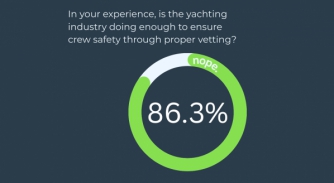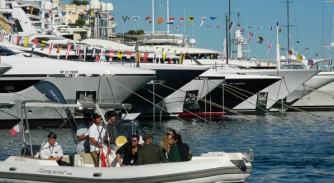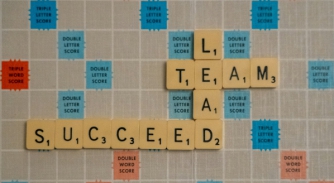CHIRP Report: MLC living conditions
When an opportunity to address crew safety and welfare concerns raised during repair period was ignored by management…

The following case study is from CHIRP Maritime’s Superyacht Feedback. It is the first superyacht-specific programme and publication dedicated to improving safety in the maritime industry through vital knowledge sharing, anonymous reporting, analysis and feedback via the Superyacht Maritime Advisory Board.
Initial report
Our reporter stated that during a recent dry-docking period, the crew were compelled to remain on board while the vessel underwent substantial repairs, raising serious safety and welfare concerns. Open fuel tanks were situated in crew living areas, and essential services such as air conditioning, water and sewage were intermittently shut down for prolonged periods. Galley refrigerators were switched off, necessitating chefs to store food in domestic fridges on the aft deck. Hazardous work, including antifouling, painting and grinding, occurred throughout the vessel, while smoke detectors were disconnected to facilitate the removal of ceiling panels, compromising fire safety. Despite these issues, no action was taken by management, prompting the crew to report the situation to CHIRP.
CHIRP Comments
CHIRP emphasises that crew living conditions were found inadequate during essential service repairs. According to the Maritime Labour Convention (MLC), management must provide suitable alternative accommodation, whether commercial or private, and health safety, and environmental (HSE) regulations take precedence during dry-docking periods regardless of vessel size or purpose.
Moreover, the master has a duty of care toward the crew, always ensuring their well-being. During dry dock, the vessel encountered hazardous operations that management should have addressed promptly. The owner’s and manager’s lack of response to crew concerns highlights a poor safety culture within the company.
It’s important to emphasise that standards must be strictly applied whether the vessel is MLC-compliant or a private yacht.
If a proper assessment of the work during the dry dock had been planned, the planned work could have been carefully managed. Management must ensure an experienced team of officers is brought in to manage the dry dock.
Factors related to this report
Culture: Management does not show a duty of care to the crew by not providing appropriate accommodation during a phase of the drydock when living conditions become unacceptable.
Situational awareness: Management has not examined the dry-dock operation in its entirety. It has either failed to recognise or ignored that the crew will face unacceptable living conditions as work progresses on the vessel.
Capability: The management has not supported their crew and they appear to lack the knowledge and experience to recognise the work requirements during the dry dock.
Communications: Management has not conveyed their expectations regarding the living arrangements during the drydocking period.
To register to CHIRP or submit your feedback, please click here.
NEW: Sign up for SuperyachtNewsweek!
Get the latest weekly news, in-depth reports, intelligence, and strategic insights, delivered directly from The Superyacht Group's editors and market analysts.
Stay at the forefront of the superyacht industry with SuperyachtNewsweek
Click here to become part of The Superyacht Group community, and join us in our mission to make this industry accessible to all, and prosperous for the long-term. We are offering access to the superyacht industry’s most comprehensive and longstanding archive of business-critical information, as well as a comprehensive, real-time superyacht fleet database, for just £10 per month, because we are One Industry with One Mission. Sign up here.
Related news

Everyone knows a Dodgy Dave
The silent risks of poor vetting – why thorough and proper background checks matter in the crew recruitment process
Crew

Time for a sea change
Dr Emma Gillett DC, CEO and founder of SeaFeedback, highlights the historic and endemic issues faced by crew and how they can be addressed
Opinion

Millions in unpaid wages secured for crew
Crews recovered £2.17m in unpaid wages via Nautilus in 2024, bringing to the fore persistent challenges as union support in the sector increases
Crew

Preventing sexual harassment on board yachts
Hill Dickinson’s Francesca Conn, Legal Director, and Caroline Prosser, Partner, offer advice on how best to prevent sexual harassment on board
Opinion

Happy crew, happy you
Captains who lead by example, showing respect, fairness and support, will not only boost on-board morale, but also mean crewmembers will work more efficiently,
Opinion
Related news
Everyone knows a Dodgy Dave
9 months ago
Time for a sea change
10 months ago
Millions in unpaid wages secured for crew
1 year ago
Preventing sexual harassment on board yachts
1 year ago
Happy crew, happy you
1 year ago
NEW: Sign up for
SuperyachtNewsweek!
Get the latest weekly news, in-depth reports, intelligence, and strategic insights, delivered directly from The Superyacht Group's editors and market analysts.
Stay at the forefront of the superyacht industry with SuperyachtNewsweek



